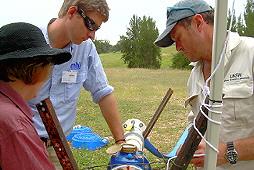Posted 20 December 2010

Industry course participants measure aquifer test flow with Hamish Studholme.
Students attending the recent inaugural National Centre for Groundwater Research and Training (NCGRT) SW-GW Field Methods School were lucky enough to find themselves enjoying the brand new course in brand new training centre.
Held at the UNSW Wellington Research Station in central western NSW, the course offers experience in a variety of the latest scientific methods for understanding and examining the connectivity between rivers, rainfall infiltration and groundwater.
One of many specialist industry training courses run by the NCGRT, the course attracted 20 students from a wide range of professional backgrounds including government; environmental consulting; and gas, energy and water utilities companies. Attendees travelled to Wellington from around Australia, Papua New Guinea and Timor Leste (East Timor).
Led by Professor Andy Baker and Professor Ian Acworth, teaching staff are drawn from both the Science and Engineering faculties of UNSW, through the unique inter-faculty collaboration of the Connected Waters Initiative.
For the inaugural course held in November 2010, classwork and fieldwork ran simultaneously in small groups around the farm and beside the Macquarie River, in recent alluvium and older fractured rock environments.
Hydrogeologist Peter Graham, the newly installed manager of the research station, helped prepare and present the many activities around the site. Soil and climate measurements were taught by Dr Matthew McCabe, while research scientist Andrew McCallum provided expertise in aquifer testing, bore design and drilling methods.
Groundwater sampling and hydrochemical analysis was taught by Dr Martin Andersen, with Dr Anna Greve introducing geophysical survey methods. Drilling technician Hamish Studholme and field engineer Sam McCulloch established the aquifer testing and down hole geophysical equipment.
Students were also able to observe demonstrations of meteorological stations, hydrological gauging and monitoring bores and gained practical tips on deploying laser level surveyors, and geophysical gear both above and below ground.
Additionally, the 4 day course included a field trip to the Baldry agricultural site, where collaborative research is coordinated by the NSW Department of Industry and Innovation. The field trip also included a visit to Wellington Caves where Professor Baker and the UNSW-CWI team are studying the relationship between ground water and the geological formations in the caves, and where a new cave was recently discovered by the team.
Feedback from the students - including both novices and those experienced in groundwater work - suggested they all stood to benefit greatly from the unique combination of theory side-by-side with practical teaching offered by the course. Furthermore, the setting for the training centre in the field location enhanced interaction between presenters and students, who, during the course, were treated to hot, home-baked scones served on a table set in a paddock and a spit roast dinner in a century old farm shed.
For more information about NCGRT Groundwater Industry Training courses go to the NCGRT Groundwater Industry Training website or email industrytraining@groundwater.com.au.
Links and more information:

Professor Andy Baker features in American Water Resources Association ‘Water Resources Impact’, September 2020 edition.

The Connected Waters Initiative (CWI) is pleased to welcome Taylor Coyne to its network as a postgraduate researcher. If you’re engaged in research at a postgraduate level, and you’re interested in joining the CWI network, get in touch! The CWI network includes multidisciplinary researchers across the Schools of Engineering, Sciences, Humanities and Languages and Law.

The Grand Challenge on Rapid Urbanisation will establish Think Deep Australia, led by Dr Marilu Melo Zurita, to explore how we can use our urban underground spaces for community benefit.

On the 21 August 2020, CWI researchers made a submission to the National Water Reform Inquiry, identifying priority areas and making a number of recommendations as to how to achieve a sustainable groundwater future for Australia.

Results published from a research project between the Land Development Department (LDD) Thailand and UNSW has demonstrated how 2-dimensional mapping can be used to understand soil salinity adjacent to a earthen canal in north east Thailand (Khongnawang et al. 2020).